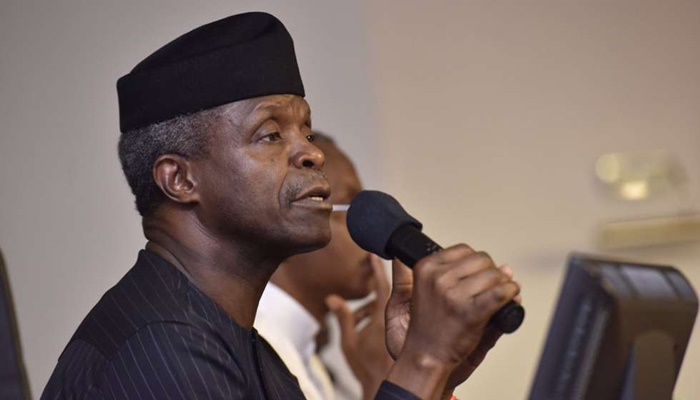Digital technology, young people’ll help drive change in agriculture in Africa —Osinbajo

More young people are leveraging on opportunities in agriculture through the use of digital technology, which is changing the face of the sector in Nigeria and Africa, according Vice President Yemi Osinbajo, SAN.
Prof. Osinbajo stated this on Wednesday while speaking during the presidential panel discussion session of the African Green Revolution Forum (AGRF) at the International Conference Centre, Accra, Ghana; with the theme “Grow Digital: Leveraging Digital Transformation to Drive Sustainable Food Systems in Africa.”
Participating alongside the Vice President on the panel discussion, which was moderated by former UK Prime Minister, Tony Blair, was the President of Ghana, Nana Akufo-Addo; Prime Minister of Rwanda, Edouard Ngirente; and Africa Union (AU) Commissioner for Rural Economy and Agriculture, Josefa Sacko.
According to the Vice President, several tech companies are already in the agricultural space. He further noted that one of the advantages of technology is collaboration, which is a major feature of digital technology.
“What we found is that there is far more collaboration than before, and there is far more transparency; you can see practically everything and everyone who is connected one way or the other. And people learn faster because of a lot of collaboration,” Prof. Osinbajo said.
He added, “People can go online and find out what a company is doing; some companies are linking investors to farmers, and it is so easy to find out what they are doing by simply going to their website. Some of the Fintech companies are also in that space helping to make payments; helping to do transactions, and a lot them are doing well just by building the space.
“The way it is going; frankly, I can’t see how it will not completely revolutionalise agriculture because practically everywhere that digital technology has touched; it completely revolutionalised. And I don’t think we have a choice. What we are going to see is that, by and large, digital technology is simply going to change the face of agriculture in Africa.’’
Continuing, the Vice President said Nigeria has a huge mobile Internet participation, as many Nigerians – from the very educated to the uneducated – access the Internet on their mobile phones.
“So, I think is actually getting easier. One of the advantages of digital technology is the fact that even when you are not a digital native, as they call them, you are able to learn faster,” he said.
Osinbajo also highlighted the use of mobile money transfer and payments by the Federal Government to reach the poorest in Nigeria.
He said, “Aside from agriculture, for example, we do a lot of cash transfer payments and payments to the poorest and most vulnerable via mobile phones and we find that they are able to use it with greater ease.
He noted that agriculture is one of the largest employers of labour in Nigeria, the Vice President added that more young people in the country are now interested in agriculture because of the impact of technology.
He said, “With respect to the place of agriculture in our economy, it is central. But speaking on how we have absorbed digital technology, one of the most unique features of what digital technology has done is that it has brought in a large number of young people into agriculture.
“Today many young people are going into agriculture, by using digital technology. Most of the digital platforms that we have that service the agricultural sector are owned by young people who increasingly see the possibilities in agriculture. Aside from the various uses of technology for purposes of tracking movement of farm products, extension services and other advantages, one of the most important advantage is the fact that young people are now very interested in agriculture; they are investing in agriculture and they are looking at the innumerable possibilities in the entire agro-allied valued chain.”
The Vice President added, “We are looking at the application of digital technology, not just in agriculture, but in our society and economy as a whole.”
The Forum attracted several ministers of food and agriculture and about 2,500 delegates.
The AGRF is premier platform for African and global leaders from both the public and private sectors to advance policies, programmes and investments, as well as harnessing agriculture in ensuring food security, increasing income and promoting economic development.
The Vice President returned to Abuja today.






